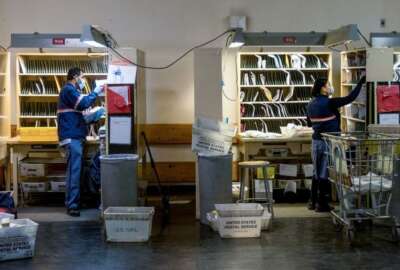Postal Service trying to make customers more aware of where lags in mail delivery occur
The Postal Service Office of Inspector General has taken a step to make the public aware of what's really going on with mail delivery. For more about the project,...
Best listening experience is on Chrome, Firefox or Safari. Subscribe to Federal Drive’s daily audio interviews on Apple Podcasts or PodcastOne.
Mail delivery is like weird weather — everyone has their own theory about it. Now the U.S. Postal Service Office of Inspector General has taken a step to make the public aware of what’s really going on with mail delivery, where it’s flagging and where it’s right on time. For more about the project, Inspector General Tammy Whitcomb joined Federal Drive with Tom Temin.
Interview transcript:
Tom Temin: Miss Whitcomb, good to have you on.
Tammy Whitcomb: Thank you. Good to be here.
Tom Temin: And let’s talk about this portal, tell us what it is you’re actually posting here at the OIG site.
Tammy Whitcomb: Yeah, if you go out to our website, USPSOIG.gov, you can see a tab, is called service performance. When you click on that tab, it pulls up a page, it’s kind of a web page that basically has a few things on it. One of the things that I think is most popular with it is it takes service performance data that the Postal Service pulls together and reports to the Postal Regulatory Commission every quarter, we take that data and actually map it, we overlay it onto a map. So you can see how the Postal Service performance, its service performance, is affecting your area of the country, your state, your local area, based on the Postal Service districts, and how the Postal Service is doing in each of the districts compared to its own goals. In addition to the map, which is really kind of cool and graphical, we also list out some of our audit reports and current audit work on service and what we’ve got going on and where we’ve identified issues in the past.
Tom Temin: Sure. And how fine grained does the day to get down to kind of get to the block or the city or the town or what?
Tammy Whitcomb: No, really the districts the Postal Service has are pretty closely aligned now to the states. So, it can get pretty close to the state. But you can kind of compare state by state or area by area against each other and see kind of where the biggest problem areas are, or have been in the past quarter for the Postal Service.
Tom Temin: Because otherwise, it’s pretty hard to know whether one is actually getting good Postal Service delivery or not. Because you don’t know when things originated. You just know what shows up in your mailbox every day.
Tammy Whitcomb: Right. And the service scores are kind of compilations of both mail that’s gone out from the area and mail that’s come in. So it kind of is a compilation score there. And one reason that we did this mapping, we saw other OIG’s that were kind of getting into taking data sets that their agencies had and making them more transparently available to the general public. The Pandemic Response Accountability Committee was doing things like that as well on their site. And we thought what kinds of data would be useful for the general public that the Postal Service has, and we found these data sets that it provides quarterly to the regulator and we thought, you know, the data was provided in spreadsheets, we thought it would be so much more useful if it was on a map. So, we just took that data and overlaid it onto a map.
Tom Temin: Interesting. And just out of curiosity, how has the Postal Service performance been in general? There’s been a lot of stories and political infighting between the Postmaster General and members of Congress, and there’s all these countercharges going back and forth. But, what is the reality of mail delivery down at the state level?
Tammy Whitcomb: Yeah, it’s been challenged in many areas of the country. Obviously, we heard a lot during the holiday mailing season about how service was really not where it needed to be, it was really challenging then. It’s picked back up since then in most areas. And it’s a better news story now than it was back in December. But still, there’s a ways to go.
Tom Temin: Sure. We’re speaking with Tammy Whitcomb. She is the inspector general of the Postal Service. And in general, what are the factors that go into good performance? What makes them able to perform well, and what can be tracked other than a hurricane or a blizzard?
Tammy Whitcomb: Right. Obviously, weather is always a big deal for the Postal Service. But COVID has had significant impacts on the Postal Service. Employee availability has been a big challenge for the Postal Service throughout the COVID pandemic. There’ve been challenges with transportation, with air transportation, and maybe one of the biggest challenges that people don’t necessarily think about with the Postal Service is that in the last year or so, since COVID began, the number of packages the Postal Service has had within its system has gone up dramatically. People have ordered a lot more things online. And package volume increases impact significantly their ability to move both packages and mail.
Tom Temin: Yeah, so they’re really oriented toward the first class or the business delivery types of brochures and flyers and stuff. But as a contractor to some of the delivery operators, that’s different than the Postal Service actually being able to handle, soup to nuts you might say are the lifecycle of package processing and delivery?
Tammy Whitcomb: Right. Well, in addition to that, just packages take up more space. There’s limitations in the amount of space in some of the facilities, the docks, the transfer locations, things like that, that you might not normally think about. But during the holiday mailing season, you just saw, just some of the facilities were just overwhelmed with volume of packages and an inability even sometimes to get mail in the door. In addition, there have been challenges with managing the workload and managing things. There’s opportunities for the Postal Service to manage these challenges better. And there’s some things with outside of their control.
Tom Temin: And in the coming year with the Postal Service, hopefully getting a contract executed to start replacing the vehicle fleet that they have with new ones. And electric is going to be part of that. And increased package is what I think the Postal Service itself sees as its own salvation, financially, or at least a part of the equation. Will you be looking at the whole facilities question in more detail? Because packages, new vehicles, needing to charge vehicles, all of this is impacting on what it is they have to do with their facilities, the docks and the handling equipment, I imagine that’s going to be the biggest thing coming up.
Tammy Whitcomb: There’s a lot going on at the Postal Service right now. As you probably know, in March, the new postmaster general released a 10 year plan that has lots of change upcoming for the Postal Service. So we will be busy, that’s for sure, in all of the areas you mentioned and many others.
Tom Temin: And getting back to the performance delivery page, are you monitoring the uptake of it? Are people visiting it? And how are you getting the word out?
Tammy Whitcomb: Yeah, we are. We’ve had a lot of traffic on it. We launched it in beta first just to sort of try it out. And then we did a bigger launch, where we put some things out on GovDelivery and other ways that we inform our customer base. And it’s gotten a lot of really good attention and we’re excited about that. We’re also looking forward to finding the next data set that would be useful for the general public so that we can do our next page that we think might be useful. So we’re studying that right now. And so keep coming to our website because there will be more to come.
Tom Temin: Well, there’s always dog bites, those are worth mapping. And Christmastime will be here eventually, and there’s probably lots of stuff to track there, too. Tammy Whitcomb is inspector general at the U.S. Postal Service. Hey, thanks so much.
Tammy Whitcomb: Thank you. Thank you so much for having me.
Copyright © 2025 Federal News Network. All rights reserved. This website is not intended for users located within the European Economic Area.
Tom Temin is host of the Federal Drive and has been providing insight on federal technology and management issues for more than 30 years.
Follow @tteminWFED






